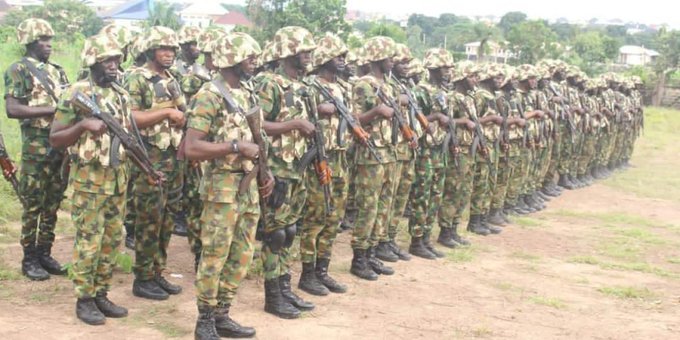Maiduguri, Nigeria — In a dramatic development that underscores the Nigerian Army’s determination to root out internal sabotage, a military court martial has sentenced three soldiers to life imprisonment after finding them guilty of selling and diverting arms to terrorists in Borno State.
The ruling, delivered after weeks of proceedings, has sent shockwaves through the military establishment and the wider Nigerian public, highlighting the grave dangers posed by insider collusion in the fight against insurgency in the northeast.
According to official sources, the convicted soldiers were found to have engaged in acts of treachery by supplying weapons and ammunition to terrorist groups operating in Borno, the epicenter of the Boko Haram and Islamic State West Africa Province (ISWAP) insurgencies. Their actions, prosecutors argued, not only endangered the lives of fellow soldiers but also prolonged Nigeria’s decade-long battle against terrorism.
Details of the Trial
The court martial, convened in Maiduguri, sat under strict military protocols with senior officers, legal representatives, and observers present. Charges against the soldiers included illegal possession of firearms, diversion of ammunition, aiding the enemy, and conduct prejudicial to military discipline.
Prosecution witnesses, including intelligence officers and fellow soldiers, provided damning evidence linking the accused to arms diversion schemes. Investigators traced missing ammunition from army depots directly to caches recovered from terrorist hideouts during counter-insurgency operations.
In his judgment, the presiding officer emphasized that the gravity of the crimes could not be overstated. “The Nigerian Army cannot and will not tolerate acts of betrayal from within. These soldiers, entrusted with the sacred duty of defending the nation, chose greed and sabotage over loyalty and patriotism. The full weight of the law has been applied to deter others who may contemplate such treachery,” he declared.
A Blow Against Insider Threats
The conviction of the soldiers has reignited conversations about insider threats within Nigeria’s security forces. For years, rumors and unconfirmed reports suggested that elements within the military and police were colluding with insurgents, providing them with weapons, intelligence, or safe passage in exchange for money.
These allegations, though often dismissed by authorities, gained traction whenever terrorists displayed sophisticated firepower or staged coordinated attacks that seemed to indicate prior intelligence.
With the court martial’s verdict, the Nigerian Army has confirmed that the problem is real — and potentially more widespread than previously acknowledged.
Reactions from the Military and Government
The Defence Headquarters, in a statement following the judgment, reiterated the military’s commitment to discipline, professionalism, and accountability.
“The Nigerian Army remains committed to upholding the highest standards of conduct. Any officer or soldier found compromising national security will face the harshest consequences. The sentencing of these soldiers to life imprisonment sends a clear message that betrayal will not be tolerated,” the statement read.
Government officials have also commended the Army’s decisiveness. A senior Ministry of Defence official described the verdict as “a victory for justice, the armed forces, and the Nigerian people.”
Public Response and Civil Society Reactions
Among ordinary Nigerians, the news has been met with a mixture of outrage and relief. Outrage at the betrayal of trust by men who swore to defend the nation, and relief that justice has been served.
Civil society organizations and human rights advocates have praised the military’s transparency in making the case public, but some insist that the root causes of such betrayals must be addressed.
“Justice has been done, but we must ask: why do soldiers betray their country? Is it greed, poor welfare, or systemic failure? If we do not address the conditions that make corruption possible, more cases like this may arise,” said an activist based in Abuja.
The Insurgency Context in Borno
Borno State has been the frontline of Nigeria’s war against Boko Haram since the insurgency erupted in 2009. Despite years of counter-terrorism operations, thousands of lives have been lost and millions displaced.
The military has made significant gains in recent years, recapturing territory once under insurgent control. However, sporadic attacks continue, with terrorists targeting both civilian and military installations.
Security analysts warn that insider collusion severely undermines these efforts, giving terrorists access to weapons, intelligence, and strategic advantage. The life sentencing of the three soldiers, they argue, is therefore a critical step toward restoring integrity within the ranks.
Implications for Counter-Insurgency Efforts
The conviction carries significant implications for Nigeria’s counter-insurgency campaign. Firstly, it serves as a deterrent, signaling that the Army is willing to prosecute and punish its own personnel when they compromise national security.
Secondly, it highlights the need for tighter control and monitoring of arms stockpiles, as well as stronger vetting and oversight mechanisms for soldiers deployed in conflict zones.
“The Army must tighten its internal systems,” said a security consultant. “Random audits, better surveillance, and improved intelligence gathering are needed to prevent weapons from falling into the wrong hands.”
Thirdly, the sentencing could boost the morale of soldiers on the frontline, many of whom have expressed frustration at the suspicion that some colleagues might be colluding with the enemy.
Calls for Wider Investigations
While the conviction of three soldiers is seen as progress, many Nigerians believe that more individuals may be involved in similar acts of sabotage. Civil society groups are calling for broader investigations into the military’s supply chains, procurement systems, and internal accountability structures.
“Three soldiers have been punished, but this may only be the tip of the iceberg,” noted a security analyst in Lagos. “There must be a comprehensive investigation into how weapons consistently end up in the hands of insurgents. Without systemic reform, such betrayals will continue.”
Some critics also argue that corruption within the wider defense establishment needs urgent attention. They contend that focusing solely on low-ranking soldiers ignores the possibility of high-level involvement in arms diversion.
Lessons for Nigeria’s Security Sector
The case of the convicted soldiers provides critical lessons for Nigeria’s broader security architecture:
- Integrity is Non-Negotiable – Security personnel must uphold loyalty and discipline, as even minor breaches can have catastrophic national consequences.
- Transparency and Accountability – Publicizing court martial outcomes strengthens public trust in the military and deters misconduct.
- Welfare and Motivation – Addressing the welfare concerns of soldiers, including pay, allowances, and living conditions, may reduce the temptation of corruption.
- Community Engagement – Building trust between the military and local communities can help detect and expose collusion faster.
- Institutional Reforms – Beyond individual punishment, systemic reforms are necessary to safeguard arms depots, monitor supply chains, and track the use of weapons.
Conclusion
The Nigerian Army’s court martial and life sentencing of three soldiers for arms sale and diversion to terrorists in Borno represents a landmark moment in Nigeria’s war against insurgency. It exposes the reality of insider threats while also demonstrating the military’s willingness to confront betrayal head-on.
For Nigerians who have long suspected collusion within the ranks, the verdict provides both vindication and reassurance. For the military, it is a sobering reminder that discipline, integrity, and vigilance must remain at the core of counter-insurgency operations.
As Borno and the wider northeast continue to grapple with the menace of terrorism, the case underscores a vital truth: victory against insurgents will not only be won on the battlefield but also within the barracks, where loyalty to the nation must remain absolute.














